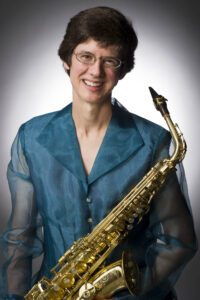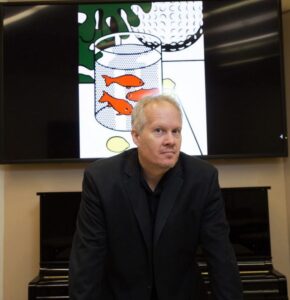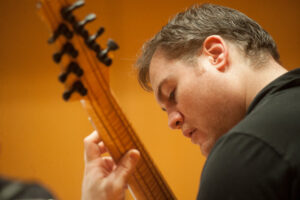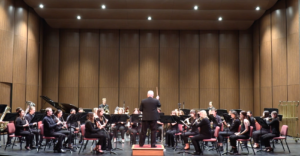Kirk O’Riordan, conductor
Saturday May 6, 2023
Williams Center for the Arts
8:00 pm
Program
Aaron Copland (1900 – 1990)
An Outdoor Overture (1941)
An Outdoor Overture was composed to be part of a series of similar pieces: Alexander Richter (Director of Music of the High School for Music and Art in New York City) requested the work to highlight his “American Music for American Youth” project. The work features three prominent themes: the first is derived from the opening motive, and is presented in several guises, including as an extended trumpet solo. The second theme is introduced by a solo clarinet, and the third is a triumphant march.
Hector Berlioz (1803 – 1869)
from Symphonie Fantastique
IV. March to the Scaffold
Hector Berlioz’s Symphonie fantastique is well regarded as a masterpiece of the Romantic orchestral canon. The work is a quasi-autobiographical fantasy that revolves around his almost fanatical attraction to a soprano named Harriet Smithson. Over the course of the five-movement piece, one melodic idea (the idée fixe, which represents Smithson) is transformed and included in visions that include his first falling in love, a masked ball, a peaceful scene in the country, his own execution, and finally, the afterlife.
Of the fourth movement, Berlioz writes:
Convinced that his love is spurned, the artist poisons himself with opium. The dose of narcotic, while too weak to cause his death, plunges him into a heavy sleep accompanied by the strangest of visions. He dreams that he has killed his beloved, that he is condemned, led to the scaffold and is witnessing his own execution. The procession advances to the sound of a march that is sometimes sombre and wild, and sometimes brilliant and solemn, in which a dull sound of heavy footsteps follows without transition the loudest outbursts. At the end of the march, the first four bars of the idée fixe reappear like a final thought of love interrupted by the fatal blow.
This piece is a remarkably inventive and colorful use of the orchestra–it is one of a handful of pieces that have redefined how the orchestra can be used. The opening of the fifth movement, for example, forgoes the traditional melody/harmony dichotomy and focuses exclusively on timbre and mood–one of the first pieces to employ musical sounds for purely visual purposes. The movement on our program is every bit as visual: here you can witness the persona’s execution through his eyes–except that because of his hallucination he is witnessing his execution as an observer in a kind of out-of-body experience. There is also a fabulous bassoon excerpt in the opening.
Kirk O’Riordan (b. 1968)
Sacred Spaces (PA Premiere)(2019)
Stacy Maugans, saxophone
Sacred Spaces was commissioned by Stacy Maugans and the Windiana Concert Band, Jeffrey Doebler, conductor. Funding for the commission was provided by an anonymous patron. It was begun in late 2019, with substantial revision and editing done during the pandemic.
The piece is essentially a meditation on several well-known Christian hymns—in an empty cathedral, bathed in light from stained glass. The wind ensemble is used primarily to replicate the reflective acoustic properties of such a space, as well as to provide a sense of power and grandeur. While Stacy’s initial idea and our subsequent conversations on what the piece might be like had more or less fully developed the concept of the piece (indeed, much of the piece was composed already) before the unrest of 2020, looking back I feel like the person doing the meditating might very well have been motivated to do so by that unrest.
With that said, there is not a literal story here—one should not understand this piece as direct attempt at creating a narrative. Rather, this is a collection of impressions, abstracted and expressionistic. The hymns are presented as memories, as ruminations; while recognizable, they are different, too…altered by time and by their own timelessness.
I am grateful to Stacy, Jeff, and our patron for the opportunity to write this piece. It was the perfect project at the perfect time.
Intermission
John Phillip Sousa (1854 – 1932)
The Liberty Bell (1893)
The Liberty Bell has become one of The March King’s most well-known and loved works. It was originally included in the score to an operetta called “The Devil’s Deputy,” and was mostly completed when the business arrangements for the operetta fell through. Around this time, Sousa and his band manager George Frederick Hinton attended a spectacular and celebratory performance called “America,” which at one point included the lowering of a large backdrop–on which was an enormous rendering of the Liberty Bell. Hinton suggested “The Liberty Bell” as a title.
The Unites States Marine Corps Band, “The President’s Own,” often performs the bell parts (played here, and in most places, on tubular bells) on the ship’s bell from the SS John Philip Sousa, a WWII-era ship. The march was performed in five of the last seven Presidential Inaugurations, including those for presidents Clinton, Bush (43), Obama, and Trump. In popular culture, the march crossed into ubiquity as the theme song for Monty Python’s Flying Circus.
Gustav Holst (1874 – 1934)
Second Suite in F (1911)
I. March
II. Song Without Words
III. Song of the Blacksmith
IV. Fantasia on The Dargason
Like the First Suite of 1909, the Second Suite had to wait more than ten years before it entered the repertoire: it did not receive a public performance until 1922 when the band of the Royal Military School of Music played it in Royal Albert Hall. Unlike its predecessor, the Second Suite is based entirely on material from folk songs and dances. The Suite opens with a March; the second movement is a lament for two young lovers separated by their parents. The third movement, The Song of the Blacksmith, is a spirited dance that features the blacksmith’s anvil. The Finale, “Fantasia on the Dargason” combines the Dargason country dance with the well-known Greensleeves melody.
Anthony J. Lanman (b. 1973)
Premeditated Attacks (With Massive Interruptions) (2023)
Co-commissioned by LCCB (PA Premiere)
I’ve often been told, “When writing for band, you can’t think like a guitarist”. This was always a bit difficult for me, as I’m, well, a guitarist. I struggled with finding the “right” way to think about band for years, and that always kept me at somewhat of a distance from the band world. I felt like an outsider, which in many ways, I am. You see, guitar is a very attack-based instrument. When played, there’s a strong initial attack on the strings, followed by a rapid decay of the note. And while wind and brass can make strong attacks, they can also perform the opposite – near silent initial attacks with long, sustained tones. I struggled with this idea of, “…you can’t think like a guitarist”, until I decided to just embrace my “attack-y” way of thinking, and make it work for band. This piece wholly embraces my guitar way of thinking, and incorporates many influences from guitar based music – most notably, heavy metal. It is my hope that you CAN think like a guitarist and make it work for this amazing ensemble.
–Notes by the composer
The Lafayette College Concert Band
Flute
Brianna Leopold, Principal
Iris Peluso
Emma Hartman
Jenna Tempkin
Lauren Kaye
Dylan Eschinger
Samantha Semsel, Piccolo
Oboe
Olivia Hoffman
Olivia Bamford
Clarinet
Emily Rice, Principal
Ryan Wedeking, Associate Principal
Ashley Kushner
Aram Ramsay
Christopher Ruebeck
Sungbum Lee
Matthew Olson
William Cassidy
Darby Aurelien, Bass
Peter Rice, Bass
Bassoon
Avery Besch
Kiki Fasce
Saxophone
Nick Colicchio (alto)
Evan Brown (alto)
Alex Kmetz (alto)
Chloe Williams (tenor)
Caleb Fossett (baritone)
Horn
Michala Dennis
Drew Borek
Megumi Barclay
Chris Giannaras
Trumpet
Zach Freiheiter, Principal
Devin Arnold
Anastasia Kiral-Victor
Olivia Lattanzi
William Blair
Trombone
Ryan Pignotti
Pedro dos Santos
Christopher Taverner
Euphonium
Jack Kerekes
Tuba
Tim Paulis, Principal
Percussion
Ellie Batchelar, Principal
Jen Galdieri, Associate Principal
Henry Pappas
Manaka Gomi
Yuko Tanaka
Abigail Harr
Graduating Seniors
Lafayette Faculty
LCCB Alumni
Guest Performers
About the Artists
Stacy Maugans, Saxophone

Photo by Kevin Fedde
Dr. Stacy Maugans serves as Chair of the Department of Music and teaches in the areas of saxophone, music theory, musicianship, performance pedagogy, and humanities at Valparaiso University, where she has received the Excellence in Teaching Award. She is also on the faculty of the Lutheran Summer Music Academy and Festival, a four-week residential music camp for high school musicians. An active recitalist, adjudicator and lecturer on the history of saxophone in Russia and the former Soviet Union, Dr. Maugans has received grants from the United States Department of Education and Social Science Research Council for studies in Russian and has performed internationally in Russia, Tanzania, China, Malta, Croatia, Germany, France, Slovenia, and Thailand. Her performances have included commissions and premieres of works by Jillian Whitaker, Benjamin Krause, David DeBoor Canfield, James Barry, Shih-Hui Chen, Karen Olsen, Michael Boo, Kirk O’Riordan, and Deborah J. Monroe. She has served the North American Saxophone Alliance in past terms as Treasurer and as Editor of the peer-reviewed journal The Saxophone Symposium and is a member of College Music Society and Phi Beta Kappa. Her administrative experience has included serving as Assistant Dean in the College of Arts and Sciences at Valparaiso University. She earned the Doctor of Music in Saxophone Literature and Performance at Indiana University under the guidance of Dr. Eugene Rousseau and the Master of Music at Arizona State University with Dr. Joseph Wytko. Her undergraduate degrees of Bachelor of Music and Bachelor of Arts in Mathematics are from Indiana University. Her hobbies include hiking, reading, and volunteering with her Scottish Collie, Calum, as a registered Pet Partner Team.
Kirk O’Riordan, Conductor

Kirk O’Riordan’s music has been referred to as “unapologetically beautiful” and is often praised for its uniquely “visual” qualities that depict a wide range of striking moods. His debut compact disk, Strange Flowers, was released by Ravello Records in November, 2013 and was praised by Audiophile Audition as “one of the most impressive and beautiful collections of chamber music I have heard in awhile….This is all just so lovely and invokes exactly the emotions that good music should be able to induce in all of us.” Gramophone Magazine praised O’Riordan as “a composer for whom imagery is a defining inspiration….[he] is a deeply sensitive composer who savours going gently into the night.” (April 2014).
His recording of his Twenty-Six Preludes for Solo Piano—by pianist Holly Roadfeldt—has attracted similar praise: “are similarly atmospheric and proceed to unfold like a magical tapestry. Each of the 26 Preludes seemingly comprising of warp and weft forming a myriad of pixels of little pictures that ultimately combines to form a moveable feast for both eye and inner ear. O’Riordan’s miniatures are informed by languorous beauty and profundity, the lyrical variations of each often feature elaborate embellishments, as well as sudden dissonant figurations that seem to mimic the gravity-defying leaps of the gazelle…” (World Music Report, April 2017).
O’Riordan (b. 1968) is an active composer, conductor, saxophonist, and teacher. His music has been performed in Canada, China, Costa Rica, Cyprus, Finland, Italy, and Russia; and in thirty of the fifty United States. Performances of his works have been featured at the Ravenna Festival (Italy), the Indiana State University, University of North Carolina, Greensboro and Western Illinois New Music Festivals, the 2008 Eugene Rousseau Birthday Celebration, national and regional conferences of the Society of Composers, Inc. and the College Music Society; and in concert by such performers as the Eaken Piano Trio, Tresillo, The Moran Woodwind Quintet, Orchestra Bruno Maderna (Italy), the Arizona State University Chamber Winds and Symphony Orchestra, the Northwestern University Contemporary Music Ensemble, the Cleveland State University Orchestra, the University of Colorado Chamber Wind Ensemble, the University of Delaware University Singers, the Williamsport Chamber Chorus and Orchestra, the Susquehanna University Orchestra and Chamber Singers, The Lafayette College Concert Band, Contemporary Music Ensemble, and Percussion Ensemble, the SKIN Ensemble, Frederick Hemke, Timothy McAllister, Lawrence Stomberg, Marianne Gythfeldt, Kenneth Tse, Jeffrey Lyman, Emily Bullock, Steven Stusek, Andrew Rammon, Reuben Councill, John Perrine, and Holly Roadfeldt.
Kirk is the recipient of numerous awards as both a composer and a performer, including annual ASCAPlus awards, a Composer’s Assistance Program grant from the American Music Center, the 2001 Arizona State University Composition Competition, the 2000 Contemporary Music Society competition, and an ERM-Media Masterworks Prize. In addition, his Cadenza for Piano Trio was one of two works selected by audience members at the CMS Mid-Atlantic/Northeast Super-regional Conference for performance at the 2008 CMS National Conference.
Kirk’s music has been broadcast on WSMR, KBAQ, WQSU, and WVIA radio. Recordings of his works appear on the Crystal Records, Ravello, Centaur, ERM-Media and EnF labels, and feature performances by Kenneth Tse, Lawrence Stomberg, Marianne Gythfeldt, Holly Roadfeldt, Frederick L. Hemke, The Kiev Philharmonic, and Farrell Vernon. He has recently received commissions from AVIDduo, Saxton Rose, and Holly Roadfeldt. He recently completed his first opera: The Masque of Edgar Allan Poe, a one-act chamber opera based on Poe’s “Masque of the Red Death” on a libretto by Lafayette College colleague Lee Upton. The work was premiered by the University of Delaware Opera Theater in November, 2016 and subsequently at Lafayette College. Other projects have focused on music for dance: his River Lights for Orchestra (as recorded by the Kiev Philharmonic) was used by dancer/choreographer Ben Munisteri in his piece, Robot vs. Mermaid. O’Riordan has also collaborated with dancer/choreographers Carrie Rohman and Nandini Sikand. Recent projects include a concerto for Taiko Ensemble and Concert Band (for the Lafayette College Percussion Ensemble and Concert Band), incidental music for a Lafayette College Department of Theater production of Mary Zimmerman’s play Metamorphosis, and a new work for viola and piano for violist Michael Hall and pianist Holly Roadfeldt.
Dr. O’Riordan joined the faculty of Lafayette College in 2009, and now serves as Associate Professor of Music and Director of Bands, teaching courses in music theory, and composition. In addition, he teaches in the First-year Seminar program and conducts the Lafayette College Concert Band and Contemporary Music Ensemble. During his time at Lafayette, the Concert Band has been hailed for its ambitious and adventurous programming, having performed works such as Husa’s Music for Prague 1968, his own orchestration of Pictures at an Exhibition, and world premieres by O’Riordan, Ashley Kushner, Justin Kogasaka, Zach Jones, Pete Deshler, and William Pfaff. Previously, he served on the faculties of Bucknell University and Susquehanna University where he taught music theory, composition, music appreciation, and (English) writing. He has also served on the faculties of Lock Haven University, Colorado Christian University, Chandler-Gilbert Community College, and Paradise Valley Community College. He holds the Doctor of Musical Arts degree from Arizona State University (the first recipient of that degree from ASU); the Certificate of Performance in Saxophone from Northwestern University; and three Master of Music degrees (composition, saxophone performance, and conducting).
Kirk has studied composition with Rodney Rogers, Randall Shinn, James De Mars, Glenn Hackbarth, Jay Alan Yim, Burton Beerman, Marilyn Shrude, and Donald M. Wilson. He has studied saxophone with Frederick L. Hemke, John Sampen, Eugene Rousseau, and Iwan Roth. In his free time, Kirk is an avid fan of Obstacle Course Racing.
Anthony J. Lanman, Composer

Anthony Joseph Lanman is an active and passionate musician that divides his time between composing, performing, teaching and advocacy for new classical music.
As a composer, Anthony creates music that reaches general audiences as well as new music connoisseurs. Embracing influences that range from progressive rock and metal, to medieval and renaissance music, to jazz, to new classical, Anthony strives to create a sound that is his own. He has written for ensembles and soloists around the world. His main teachers have been P.Q. Phan, Don Freund, Sven-David Sandstrom, Marc Mellits and thousands upon thousands of recordings.
Anthony’s performing career began in high school while singing and playing electric guitar with his touring progressive band Canvas. His principle instrument changed to classical guitar during his undergraduate years at University of Texas at Austin where he studied with Adam Holzman. Through his graduate study at Indiana University he added renaissance lute and theorbo to his instrumental arsenal, studying with Nigel North. He has performed with the University of Texas New Music Ensemble, the University of Texas Early Music Ensemble, the Indiana University New Music Ensemble, the Indiana State University Wind Ensemble, and Clocks in Motion. He has also performed many concerts of solo and chamber music.
Anthony’s advocacy is life-long. In the nineties, he hosted a contemporary classical music radio show on KVRX in Austin, Texas. In the 21st century, he promoted fellow Indiana University composers through a web presence on Mp3.com (now defunct); created Guitar Heroes, a weekly presentation series in Second Life; and produced hundreds of episodes of his ongoing music-centric podcasts All the Cool Parts, 1,000 Recordings Podcast and 1 Track. In addition, he has exposed thousands of new listeners to contemporary classical composers by sharing this music to his more than 400,000 followers on Soundcloud.
Anthony holds a BM in composition from the University of Texas, and an MM and DM in composition from Indiana University and currently resides in Bloomington, IN with his wife Jenna and their cats Silas and Bod.
The Lafayette College Concert Band

The Lafayette College Concert Band is comprised of approximately 50 students from a variety of majors who are united by a strong desire to perform the highest quality music at the height of their abilities. Participation in LCCB is open to students in any major as well as faculty and staff. The ensemble is conducted by Kirk O’Riordan, Associate Professor of Music.
LCCB typically performs one concert each semester. The repertoire is selected from traditional concert band masterpieces, newer works by established and emerging composers, commissions, and orchestral transcriptions. Past concerts have included works such as Husa’s Music for Prague 1968, Bernstein’s Symphonic Dances from West Side Story, both Holst Suites, Grainger’s Lincolnshire Posy, and Mussorgsky’s Pictures at an Exhibition. LCCB has premiered works by composer/conductor Kirk O’Riordan and 2010 Pesky Artist in Residence William Pfaff as well as Anthony J. Lanman, Anna Zittle ’22, Justin Kogasaka ’22, Ashley Kushner ’19, and Zach Jones ’13.
Students enroll for 1/4-credit. LCCB is open to all students (regardless of major), faculty and staff. LCCB employs a wind ensemble model for instrumentation–one on a part except for flutes, clarinets, and trumpets. A seating audition is required before the first semester of participation. Due to the large numbers of flutists, clarinetists, saxophonists, and trumpeters, the number of available seats in these sections is limited.